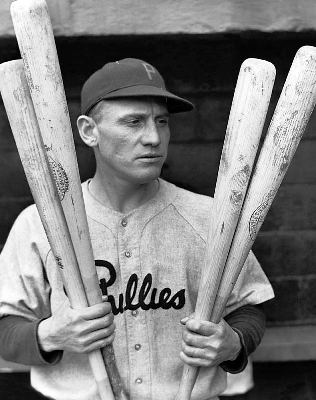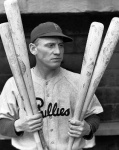May 22, 1930: Phillies finally beat Giants on Chuck Klein’s home run
 The Philadelphia Phillies had lost all six games they had played against the New York Giants in 1930, including an 11-4 drubbing on May 21, when the teams
The Philadelphia Phillies had lost all six games they had played against the New York Giants in 1930, including an 11-4 drubbing on May 21, when the teams met again on May 22. Could the Phillies turn it around? They could certainly slug the ball. In 1929 left fielder Lefty O’Doul batted .398 with 32 home runs; right fielder Chuck Klein hit .356 and set a National League record with 43 home runs; and first baseman Don Hurst contributed 31 homers. What worried Phillies manager Burt Shotton was the team’s pitching. The team ERA in 1929 was 6.13, the highest in the major leagues, and so far in 1930, it was even higher at 6.44.1
met again on May 22. Could the Phillies turn it around? They could certainly slug the ball. In 1929 left fielder Lefty O’Doul batted .398 with 32 home runs; right fielder Chuck Klein hit .356 and set a National League record with 43 home runs; and first baseman Don Hurst contributed 31 homers. What worried Phillies manager Burt Shotton was the team’s pitching. The team ERA in 1929 was 6.13, the highest in the major leagues, and so far in 1930, it was even higher at 6.44.1
Shotton chose Claude Willoughby, a 31-year-old right-hander, to start the game of May 22. Willoughby had compiled a 15-14 record in 1929, but he was off to a poor start in 1930, with an 11.17 ERA in five appearances. To thwart O’Doul, Klein, and Hurst, all left-handed batters, Giants manager John McGraw selected Bill Walker, a 26-year-old southpaw whose 3.09 ERA had led the National League in 1929. An estimated 5,000 fans attended the Thursday afternoon contest at the Polo Grounds in New York.
After a scoreless first inning, the Phillies got on the board in the top of the second when Hurst homered with a man on. Mel Ott, the Giants’ 21-year-old sensation, led off the bottom half by doubling into the left-field corner, and he scored on Bob O’Farrell’s single. In the third inning, O’Doul slugged a two-run homer for the Phillies, and Bill Terry’s sacrifice fly brought one in for the Giants. In the fifth, Freddy Leach clubbed a two-run homer for the Giants to even the score at 4-4.
The Phillies retook the lead in the sixth by scoring twice on three hits and an error. Klein led off the seventh with an apparent double but was called out for failing to touch first base, a mistake that would cost the Phillies a run. Pinkey Whitney followed with a double, and Hurst’s single drove in Whitney and sent Walker to the showers.
But the Giants kept coming back. After Terry’s triple in the eighth, Ott clouted a two-run homer, and the Phillies’ lead was cut to 7-6. In the top of the ninth, the Phillies gained an insurance run from a walk and two singles off rookie pitcher Ray Lucas.
The Giants batted against Willoughby in the bottom of the ninth trailing by two runs. Rookie Eddie Marshall singled to lead off, but Shanty Hogan flied out and Leach struck out. The Giants were down to their last out when Freddie Lindstrom stepped to the plate. A right-handed batter, Lindstrom lined the ball off the parapet of the left-field roof for a dramatic two-run homer. The game went to extra innings deadlocked at 8-8.
McGraw sent Clarence Mitchell to the mound in the 10th inning. This was the first appearance for the 39-year-old southpaw since he was acquired by the Giants in a trade with the St. Louis Cardinals on May 15. When the spitball was banned in 1920, Mitchell was one of 17 spitball pitchers permitted to throw the pitch until he retired. Ten years later, only four legal spitballers were still active and he was the sole left-hander.2
Tommy Thevenow singled, Klein doubled, and Whitney drew a walk to load the bases, but Mitchell fanned Hurst to get out of the jam. Ott led off the bottom of the 10th inning with a walk, convincing Shotton to replace Willoughby with rookie Earl “Hap” Collard, a 31-year-old right-hander. Collard was effective, retiring the next three hitters.
Fresco Thompson laced a triple to the right-center field gap to start the top of the 11th inning. He could not advance on Spud Davis’s groundout, but he tagged up and headed home on Collard’s fly out to Leach in left field. Leach’s throw home was on the mark and catcher O’Farrell applied the tag for a nifty double play. Collard retired the Giants in order in the bottom half.
The Phillies finally broke the tie in the top of the 12th inning. With Thevenow on and two outs,
“Mitchell pitched carefully to Klein and had a strike on the Philadelphia outfielder when he threw another spitball that didn’t break just as he expected it would. Bang! Klein swung with plenty of power and the ball sailed on a line and away into right field. It would have been a home run hit in any man’s ball park.”3
The blast was Klein’s 11th home run of the season.
Lindstrom led off the bottom of the 12th inning with a single. Terry flied out and Ott drew a walk. Hurst nabbed Pat Crawford’s sharp grounder at first base for the second out, and the runners moved up a base. With two outs and two men in scoring position, O’Farrell drove the ball to deep left field. At first the crowd cheered what looked to be a game-winning three-run homer, but O’Doul raced back and caught it near the outfield wall to end the game.
The final score was Phillies 10, Giants 8. The winning pitcher was Collard and the loser was Mitchell. The slugfest featured six home runs, two triples, and five doubles.
No doubt, the Phillies could hit. Klein finished the season with a .386 batting average, 40 home runs, and 170 RBIs. But the 6.71 team ERA doomed the 1930 Phillies to a last-place finish in the National League.
Sources
The author relied on the game accounts in the May 23, 1930, issues of the Philadelphia Inquirer, New York Times, and Reading (Pennsylvania) Times.
Notes
1 Computed by the author from box scores, through games of May 21, 1930.
2 The other three legal spitballers in 1930 were Burleigh Grimes, Red Faber, and Jack Quinn.
3 Reading (PA) Times, May 23, 1930.
Additional Stats
Philadelphia Phillies 10
New York Giants 8
12 innings
Polo Grounds
New York, NY
Box Score + PBP:
Corrections? Additions?
If you can help us improve this game story, contact us.

